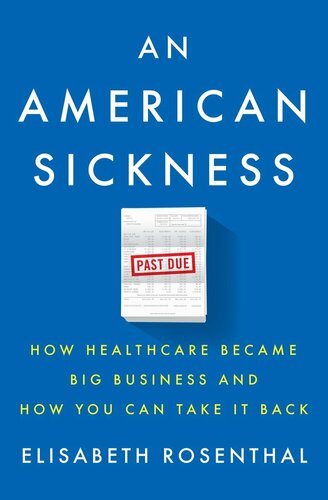
An American Sickness
How Healthcare Became Big Business and How You Can Take It Back
چگونه مراقبتهای بهداشتی تبدیل به یک کسبوکار بزرگ شد و چگونه میتوانید آن را پس بگیرید
کتاب های مرتبط
- اطلاعات
- نقد و بررسی
- دیدگاه کاربران
نقد و بررسی

Starred review from February 6, 2017
Rosenthal, a New York Times senior writer and former physician, provocatively analyzes the U.S. healthcare system and finds that it’s “rigged against you,” delving into what’s gone wrong as well as how Americans can make it right. In the first part of this astounding takedown, Rosenthal unveils with surgical precision the “dysfunctional medical market” that plays by rules that have little to do with patient-centered, evidence-based medical care. In part two she prescribes the rigorous but necessary steps to fix the broken system. Rosenthal chronicles a startling cascade of escalating pressures that steadily drove up medical costs, including the skyrocketing spread of health insurance coverage in the 1940s and ’50s, hospitals’ adoption of big-business models, and doctors’ convoluted payment schemes. “Our healthcare system today treats illness and wellness as just another object of commerce: revenue generation,” Rosenthal writes. She also notes that politicians, insurers, hospitals, and doctors have all maneuvered to “undermine” the Affordable Care Act. Her advice for now is starkly simple: we need to question everything, including your choice of doctor, hospital, billing statement, insurance, and the drugs and devices we’re prescribed. Given the “false choice of your money or your life,” Rosenthal argues, “it’s time for us all to take a stand for the latter.”

March 1, 2017
A blast across the bow of the entire health care industry, which "attends more or less single-mindedly to its own profits."Rosenthal, a senior writer for the New York Times who has a Harvard Medical School degree and served as a physician at New York-Presbyterian Hospital, asserts that the American medical system is sick, having lost its focus on health. In the introduction, her list of "Economic Rules of the Dysfunctional Medical Market" includes such gems as "1. More treatment is always better. Default to the most expensive option," and "10. Prices will rise to whatever the market will bear." She begins by demonstrating how for-profit insurance changed the way hospitals operate and doctors practice medicine and how it has revolutionized the pharmaceutical and medical device industries. Throughout, the author blends extensive research with human interest. A personal horror story, with names and dates, opens each chapter: an individual dies or nearly dies, someone is overtreated, or someone receives a staggering bill for a simple test or procedure. In forthright language--Rosenthal uses blunt terms like "crapshoot" and "mess"--individual chapters focus in turn on hospitals, physicians, pharmaceuticals, medical devices, testing, and assorted medical business such as billing, coding, and collection agencies. One or more of the 10 "Economic Rules" sums up each presentation, driving home the author's message of a deeply flawed medical-industrial system. Rosenthal then offers advice to patients on how to make the system more responsive and affordable. Beyond that, she details what changes society could and should demand through updates of regulations and laws. Five appendices provide further guidance, including a glossary of terms used in medical billing, sources of information on the internet about doctors, hospitals, procedures, and drugs, and templates for concise and effective protest letters. A scathing denouncement, stronger in portraying the system's problems than in offering pragmatic solutions.
COPYRIGHT(2017) Kirkus Reviews, ALL RIGHTS RESERVED.

November 15, 2016
Think our health system is ailing? Wait until your read this book by Rosenthal, the New York Times senior writer (and Harvard M.D.) who authored the investigative series "Paying Till It Hurts." A scary nuts-and-bolts explanation of how U.S. health care works plus guidance on how to cope. Did you know that if you can't pay your medical bills you could lose your home?
Copyright 2016 Library Journal, LLC Used with permission.

























دیدگاه کاربران